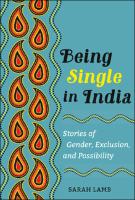Being Single in India
Stories of Gender, Exclusion, and Possibility
Abstract
Today, the majority of the world’s population lives in a country with falling marriage rates, a phenomenon with profound impacts on women, gender, and sexuality. In this exceptionally crafted ethnography, Sarah Lamb probes the gendered trend of single women in India, examining what makes living outside of marriage for women increasingly possible and yet incredibly challenging. Featuring the stories of never-married women as young as 35 and as old as 92, this book offers a remarkable portrait of a way of life experienced by women across class and caste divides. For women in India, complex social-cultural and political-economic contexts are foundational to their lives and decisions, and remaining unmarried is often an unintended consequence of other pressing life priorities. Arguing that never-married women are able to illuminate their society’s broader social-cultural values, Lamb offers a new and startling look at prevailing systems in India today. “This pathbreaking book offers a vital analysis of the rising but unrecognized category of single women in a marriage-minded society such as India. Through beautifully rendered and diverse stories, Sarah Lamb challenges conventional wisdom.” —MARCIA C. INHORN, William K. Lanman, Jr. Professor of Anthropology and International Affairs, Yale University “For fans of Lamb’s evocative narratives on Bengali widows, her new book provides another rich look at the negative space of marriage: the rare demographic of single women in Bengal across class and caste.” —SRIMATI BASU, author of The Trouble with Marriage: Feminists Confront Law and Violence in India “This lively ethnographic account makes several key contributions to feminist anthropological appraisals of marriage as an institution. Lamb renders a compelling, detailed, and sensitive portrait of compulsory heterosexuality and patriliny as seen from the margins.” —LUCINDA RAMBERG, Associate Professor of Anthropology and Feminist, Gender, and Sexuality Studies, Cornell University


 Download
Download Web Shop
Web Shop